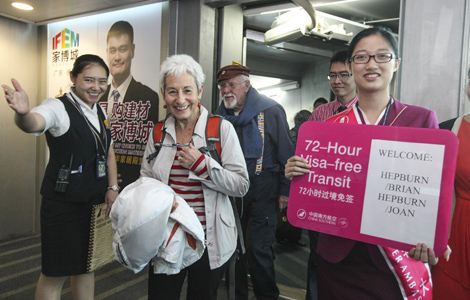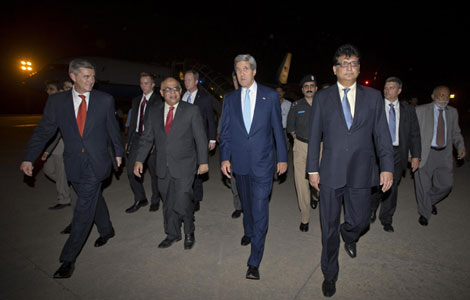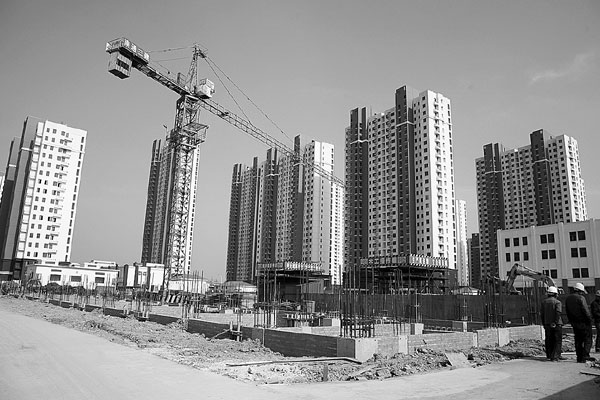Property developers' appetite for funds to stay stable in H2
Updated: 2013-07-31 07:22
By Gao Changxin in Hong Kong (China Daily)
|
||||||||
|
Developers will borrow at least 70 percent of the amount they did in the first half, or 63 billion yuan ($10.3 billion), despite an expected hike in borrowing costs, according to Deloitte. Provided to China Daily |
Chinese property developers are expected to stay hungry for overseas funds in the second half, after borrowing a stunning 90.3 billion yuan ($14.62 billion) in the first six months of the year, accounting firm Deloitte Touche Tohmatsu Ltd said on Tuesday.
In the second half, developers will borrow at least 70 percent of the amount they did in the first half, or 63 billion yuan, despite an expected hike in borrowing costs, Deloitte said. That will bring this year's total to 153 billion yuan, more than double the 70 billion yuan they raised last year.
Richard Ho, a real estate managing partner with Deloitte in Hong Kong, said the borrowing frenzy comes as a series of short-term trust loans borrowed by the developers will mature this year and next.
"They have no choice but to raise money to repay those earlier loans, which have a duration of just two to three years," said Ho in a news conference in Hong Kong.
The fundraising moves will start in late August, when the developers finish reporting their first-half results, he added.
Most of the first-half issuance took place in Hong Kong. In a high-profile deal, China Vanke Co Ltd - the country's biggest residential developer by market value - issued $800 million in a five-year fixed-rate dollar bond in the city on March 27. On the same day, Greentown China Holdings Ltd raised $309 million at an interest rate of 8.5 percent.
The developers are set to pay higher interest rates in the second half, as the US Federal Reserve's talk of tapering off the scale of its asset-buying program pushed bond yields higher worldwide, said Ho. The Fed didn't give an exact time for the move, but many analysts believe it will start at the end of this year.
The yield of the 10-year US Treasury bond was at 2.61 percent on Monday, 75 basis points higher than the 1.86 percent at the start of the year. Higher US Treasury yields push up bond prices worldwide as many bonds are priced against it.
"Developers will have to pay more in the second half, especially the smaller ones that have weak credit ratings," said Ho.
Bonds issued by industry leaders with pristine credit ratings will probably yield 4 to 5 percent, while smaller players might have to pay over 10 percent, said Ho.
Yields have already jumped on existing bonds in the second quarter, in the wake of a money market rate hike and the growth slowdown. According to the weighted average of 80 property bonds tracked by Deutsche Bank, yields on Chinese real estate bonds increased 98 basis points in the second quarter to 8.54 percent, the highest level since Nov 23.
Developers will likely choose to borrow overseas because regulations effectively block them from borrowing in the domestic market, as part of the government's effort to curb surging property prices.
gaochangxin@chinadaily.com.cn
(China Daily 07/31/2013 page16)

 Snowden granted 1 year's temporary asylum in Russia
Snowden granted 1 year's temporary asylum in Russia
 China sails through 'first island chain'
China sails through 'first island chain'
 City's visa-free offer gets first takers
City's visa-free offer gets first takers
 Property prices rise again
Property prices rise again
 One-stop service offers new hope
One-stop service offers new hope
 Private museums increasingly under spotlight
Private museums increasingly under spotlight
 Apple CEO met China Mobile head, talked co-op
Apple CEO met China Mobile head, talked co-op
 Kerry in Pakistan on unannounced visit
Kerry in Pakistan on unannounced visit
Most Viewed
Editor's Picks

|

|

|

|

|

|
Today's Top News
Snowden granted 1 year's temporary asylum in Russia
China sails through 'first island chain'
US rethinking Putin summit
Property prices rise again
China 'to add more to global growth'
Nation 'confident' on trade
Snowden has entered Russia: lawyer
China opposes US resolution
US Weekly

|

|








